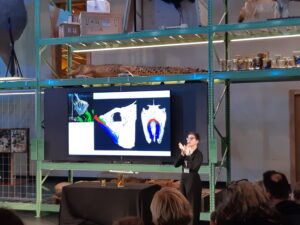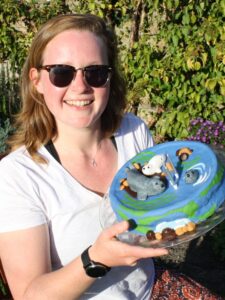School of Biology Public Engagement Award Winners 2022
The School of Biology Public Engagement Committee is pleased to announce the winners of our 2022 Public Engagement Awards. These awards recognise a sustained commitment to high quality public engagement with research and are open to all students and most non-academic staff in the school. Congratulations to Dagmar, Emmajay and Izzy! You can see details below about the incredible work they have been doing.
Dagmar der Weduwen

I have become very involved in science communication since the start of the COVID pandemic. I have appeared on multiple podcasts to speak about my research on winged seed dispersal and archerfish behaviour, and my 3-minute talk on human facial recognition by archerfish led me to win the Judges’ Runner Up and Audience Favourite prizes in the 2021 FameLab competition. Since then, I have started a YouTube channel where I post videos for my “Smart Fish Series”, explaining fish adaptations and behaviour, and “Definitions with Dagmar”, explaining academic and scientific words and phrases. I also started a Twitch show at the end of last year called Science & Sorcery, where science communicators play D&D to raise money for charity. To date, we have raised more than £2000 in only four sessions! I also recently did a 3-month internship at Naturalis Biodiversity Center in the Netherlands, where I presented my research to the museum visitors. Later this year, I will be at the Cheltenham Science Festival as part of several events, including their science Comedy Night, as well as bringing Science & Sorcery to the BIG Conference for science communicators in Belfast.
Emmajay Sutherland

I’m a 3rd year PhD student researching biosynthetic pathways involving enzymes to create potential anti-cancer drugs within the Czekster lab of the BSRC. These past few years at the University have allowed me to explore my passion for public engagement by becoming involved in different projects. For example, I have been able to interact with children of all ages through making videos for the annual Science Discovery Day and creating scientific exhibitions at the ‘Following Her Footsteps’ event at the Bell Pettigrew Museum which aimed to encourage young children, specifically girls, into STEM subjects. I am incredibly grateful for the opportunity to be a part of Cell Block Science where scientific discussions and demonstrations were given to groups of prisoners. I have thoroughly enjoyed all of the public engagement opportunities from the University and it is definitely an essential skill all researchers should devote time and effort to. I would just like to mention my supervisor, Clarissa Melo Czekster, Calum McAndrew and the Public Engagement Team at the University for all their effective work – I would not be where I am today without their constant support and help.
Izzy Langley

I have held a variety of research-related roles at the Sea Mammal Research Unit (SMRU) since joining in 2015 and have been actively involved in public engagement and outreach efforts. This has covered a diverse array of activities including family friendly science days, outreach in the Scottish Prison system, engaging local communities during fieldwork, delivering outreach talks to naturalist groups, and being active on my professional social media accounts. I was involved in Cell Block Science, a national programme to promote STEM subjects in prison learning centres and delivered two marine mammal sessions at HMP Perth. I have presented my own research and ongoing research by colleagues at SMRU to a number of non-academic audiences, including at RSPB Dolphin Fest, and to volunteer naturalist groups such as the Orkney Marine Mammal Research Initiative, WDC Shorewatch, and the Forth Marine Mammals Facebook group. I have also written articles for the Mammal Society and contributed to an episode of the podcast Join the Pod. Alongside these events, I have developed outreach materials, including a Snap! card game using grey seal photo identification data, highlighting how we recognise individual animals to study their populations. I really enjoy the public engagement side of my work, and I regularly receive thought-provoking comments from non-academic audiences which contribute to the way I address my research. Public engagement is therefore a valuable asset to my research career, and I plan to continue contributing to the dissemination of the work that we do to as wide and diverse an audience as possible.
You must be logged in to post a comment.